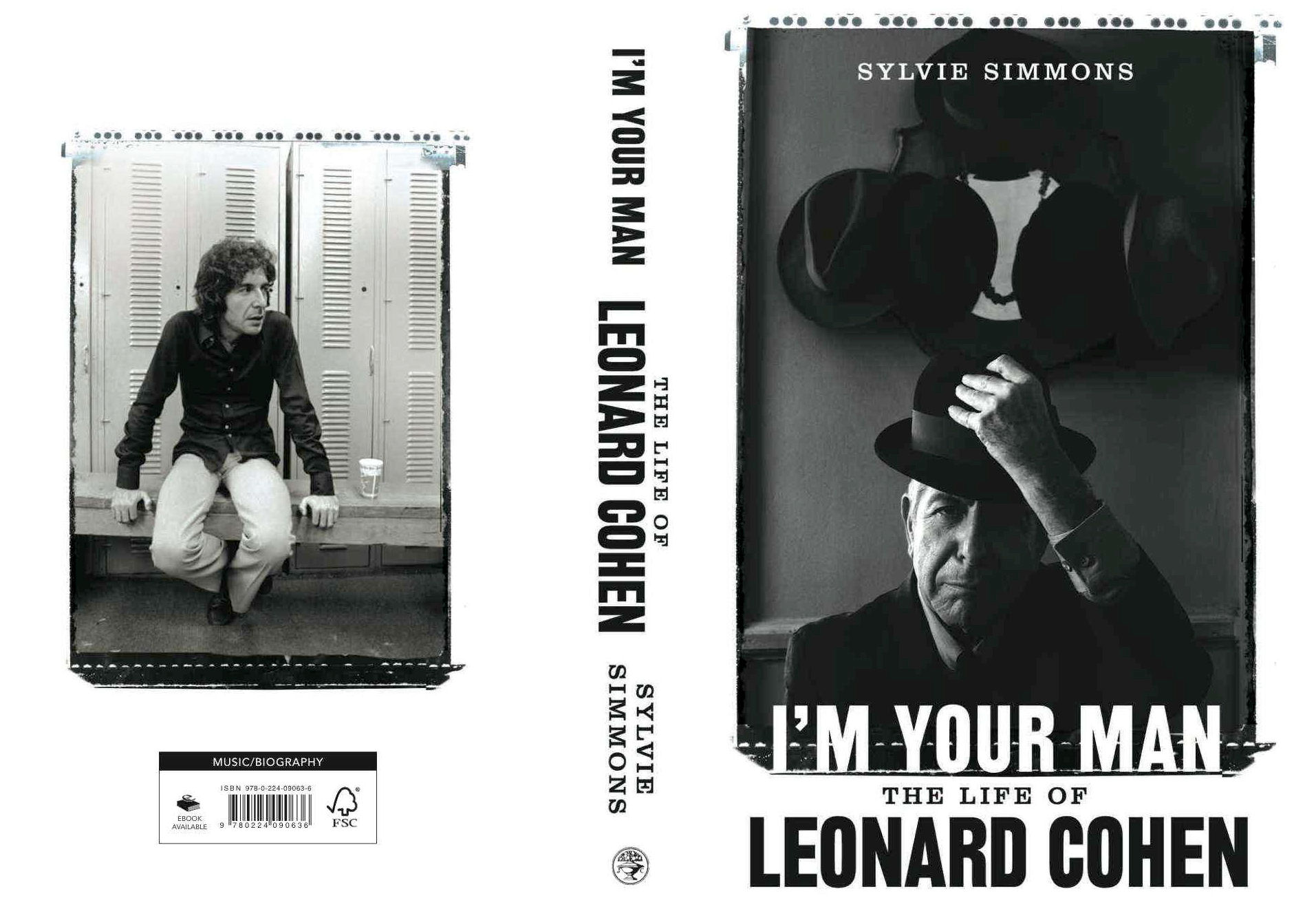
The UK book sleeve, front and back
UK publication date: November 1, 2012
(Jonathan Cape / Random House)
INTERVIEW
WITH
SYLVIE
SIMMONS
by Jarkko Arjatsalo, September 2012
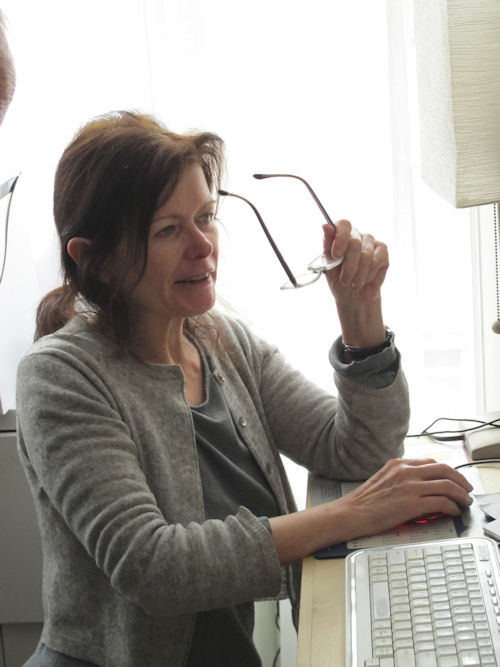
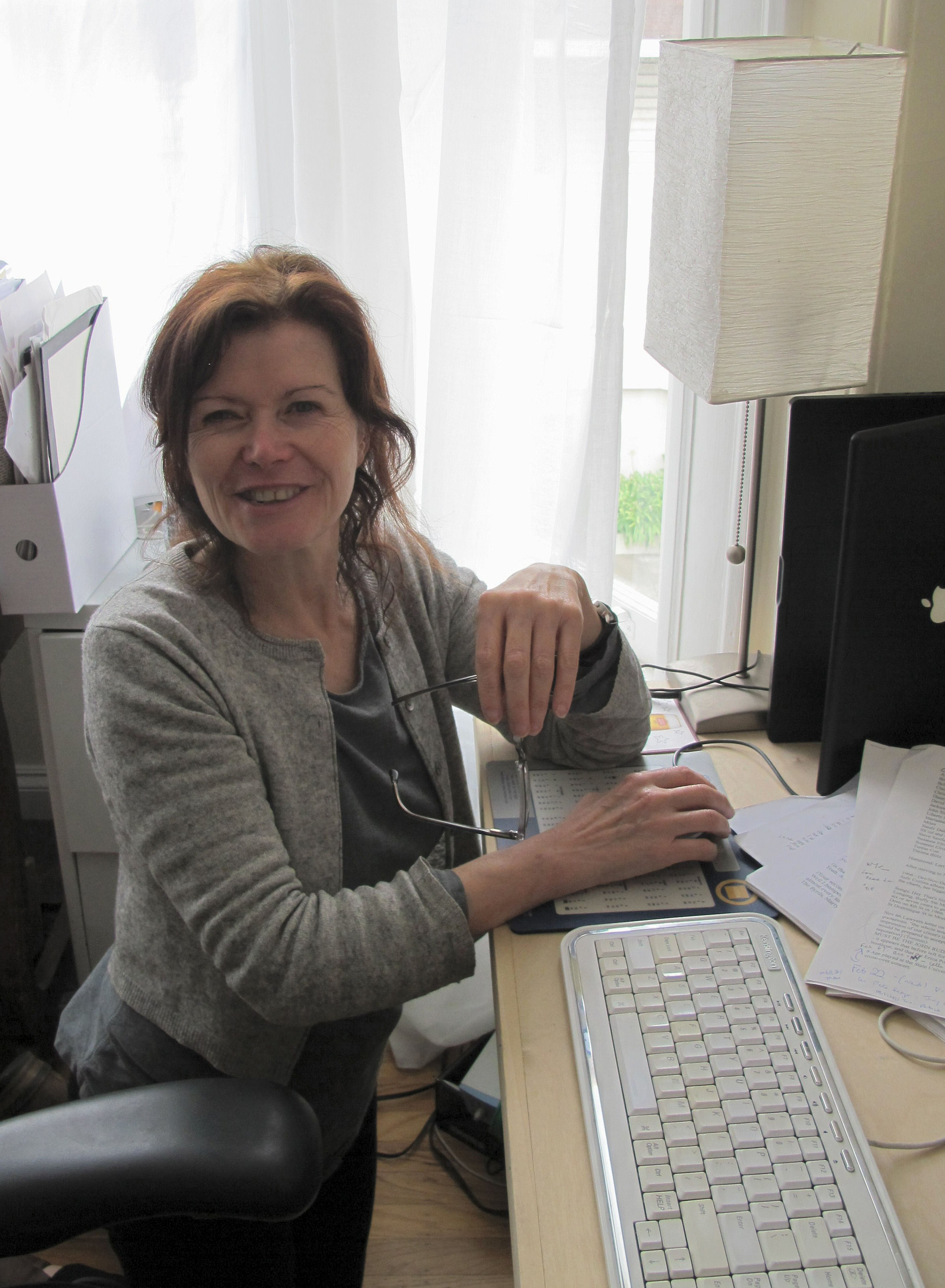
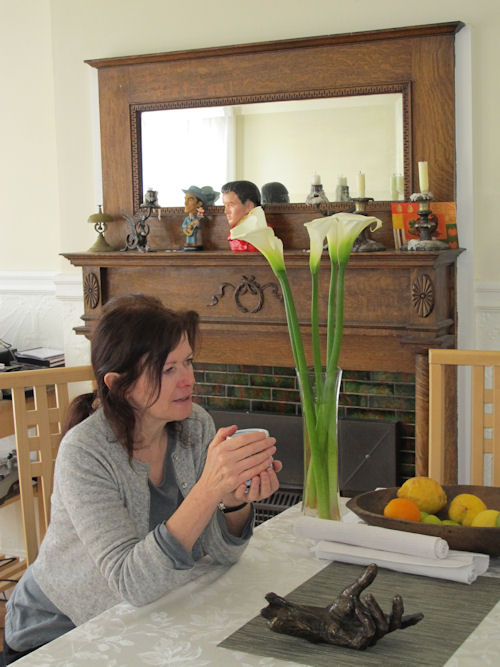
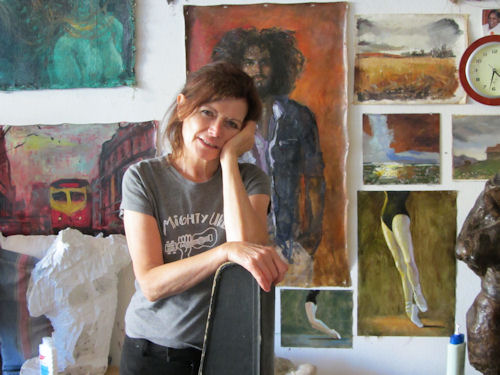
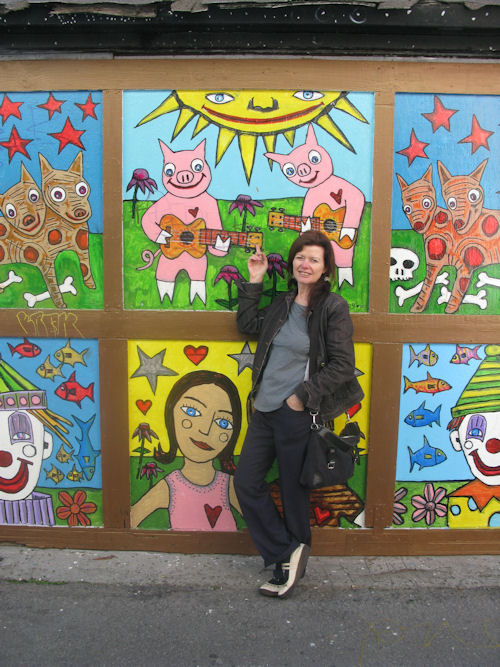

Photos above from San Francisco in December 2010
Photos below from the Madison Event, August 2012
All photos © Eija Arjatsalo
except 4th photo © Tod Regan
All rights reserved
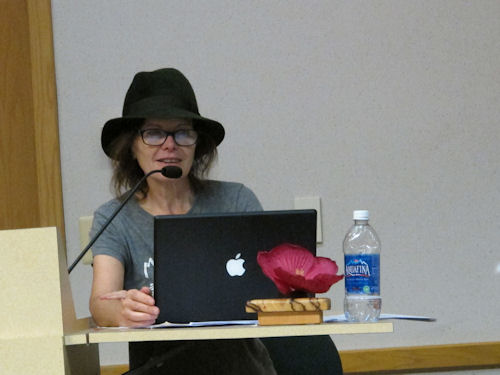

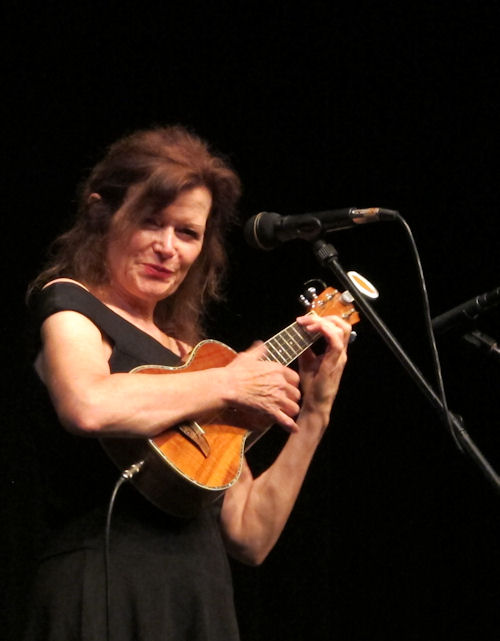
|
Would you please first tell us something about yourself!?
I was born and raised in London and my childhood was spent listening to music, singing, tap-dancing, writing little stories, and hatching plots to escape and see the world. After a few practice-runs, I moved to L.A in the late Seventies with a suitcase and a portable typewriter to be a rock journalist, and that's what I've been doing ever since. I've written a few books, fiction and nonfiction, written a bunch of liner notes and some songs on my ukulele, and along the line I've won a couple of awards. I live in San Francisco now, still writing about music and still finding myself hatching plots to escape.
A new biography of Leonard Cohen. Why Leonard Cohen?
Leonard was considerate enough to choose the second I hit puberty to release his debut album, and a girl never forgets her first. I remember hearing his voice for the first time on a compilation album CBS released in the UK in 1968 - he was singing 'Sisters of Mercy'. I can clearly remember that it lifting me up and pinning me to the wall. At that time I didn't stop to analyse why it should have had such a powerful effect, but thinking about it since, I believe it had to do with that mix of intimacy and authority in Leonard's voice and the sense that this wasn't just some regular guy, this was a man who knew something, who understood, and who had come alone to you, personally, to explain the mystery. His songs were so very mysterious, but somehow familiar. I do know that they kept drawing me back. I loved my first vinyl copy of Songs of Leonard Cohen to death - the grooves were gouged raw and the edges of the LP curled from the heat from the old record player that I'd forget to turn off at night. I still have that original copy (and many new copies since). Because the affair didn't stop there. Leonard has never stopped intriguing and seducing me with his words and songs.
But why did you write a book?
Well the first time I thought seriously about it was in 2001. Leonard was in London (where I then lived, having moved back after living in France) and I interviewed him in some depth for one of those long articles in MOJO magazine. Our interview stretched over three days - no nights [smiles] - but it only made me want to know more - not as a fan, but as a music writer. I had a shelf and a half at least of serious books on Bob Dylan, but there were nothing like as many on Leonard. So I felt there was room for another. At the same time I knew enough about Cohen's life and work that I knew writing such a book was going to be hard work. I've tended to write short books, treating them more as an extended piece of music journalism or essay, but I knew that this wouldn't do for a book on Leonard Cohen. So I kept putting the idea on the back burner. Then one day, during the last tour, it refused to stay there. any longer And so in 2009, the adventure began.
How did Leonard feel about the new biography? Was he supportive?
Leonard neither wanted a book about himself or asked me to write it; nor did he ask if he could read and approve what was in it. But none of these stopped him from giving his support. If I had not had his support, it would not be the book it is. In the beginning, I'm sure he must have been in two minds about it - he is after all, as you know, a quite shy and very private man. And to write a book about someone - to do it properly, to go back the source, to retrace his steps, go to the places he's lived, talk to his childhood friends, his publishers, his muses, his lovers, his musicians, his rabbis and his fellow-monks, digging around for facts and stories and insights - well, it's a hell of an intrusion. But Leonard stopped no-one from talking to me (which is not always the case with the subject of a biography), he even talked to me himself, and allowed me to use material I found in his archives - and loaned me photos from his personal collection. It would be nice to think that, as the months of investigation turned into years and he'd get a call from yet another name from the past asking about this British woman who'd asked for an interview, that maybe once or twice, when he picked up the phone it might have made him smile. Whatever his feelings about it, he was the perfect gentleman.
Tell us about the structure of the book? Which aspects did you put emphasis on?
I wanted to write about it all: the poetry, the prose, the songs, the art, the women, religion, depression, everything. Because it seemed to me that you couldn't write about one thing without writing about the other, that they were all intertwined, and that it would be pointless writing about that thing if you didn't do so with as much diligence, depth and insight as you could bring to it. I knew from the beginning it was going to be a long book. And I knew from the beginning that I wanted it to be dense with information but I also wanted it to dance off the page. With an agenda like that, I was going to need some kind of structure to work within, or it would turn into some multi-volume, Churchillian 'Leonard Cohen: The War Years' thing.
So before I began I made some kind of road-map - a very basic one, but still around 15,000 words in length, around twenty pages, planning out what I thought might be a good route to take and where to stop along the way. But the original outlines of the roads started to dissolve and reform in different shapes fairly soon into the book as my research and interviews turned up more stories, more music, more things I hadn't heard before. Then all these stories had to be double- and triple-checked. Unless I could find two, preferably three, sources - original sources, preferably - or some physical evidence that convinced me it was true (for example, a postmarked letter, an item in Leonard's archive, a list of cards in the cellar of a recording studio listing who was doing what and when) - however wonderful the story might be, I did not feel it could be used.
The other thing about the structure was I knew that I wanted Leonard's voice and presence to permeate the book. So I have him there in person at the beginning of the book, in the prologue, and also at the end of the book, in the epilogue, talking the reader out. He is, after all, not merely the subject of a book but a living man, and I wanted his personality in there. So, here and there throughout the (chronological) narrative, there is a kind of ongoing conversation between Leonard and me in which we hear in his own voice about something that occurs in the period which that chapter covers.
You talked to a lot of people who have been a part of Leonard’s life at some point. Tell us about that!
More than a hundred of them, and there are so many stories I don't know where to start. I began my book where Leonard began his life, in Montreal [damn, that place is cold in winter!] where, from the outset, I met and talked to some wonderful people. For example Mort Rosengarten, the sculptor, Leonard's friend since the age of nine. He was suffering from emphysema, but still he trudged out in the snow with me, with a portable ventilator, to one of the old Jewish delis with oilclothed tables on the Main, where he and Leonard used to, and still, go. He definitely had some stories! Another of the memorable moments in Montreal was talking to the old rabbi, at the synagogue that Leonard's ancestors had founded, who taught Leonard's bar mitzvah class. And this was just the first chapter. So, those were the first - and the last, if I remember rightly, was Rebecca De Mornay.
There were so many memorable people and events. I went to stay at the monastery on Mt Baldy and, on my first night, jammed into the early hours on my uke with the mandolin-playing monk in charge (not Roshi, he was away at the New Mexico Zen Centre). When I came down from the mountain (I did not stay five years, like Leonard did; I was ready to dig an escape tunnel after two days) I stopped in Claremont and visited Chris Darrow, who was in the Kaleidoscope, the group which played, uncredited, on Leonard's first album. Darrow is a brilliant musician - but he was gracious enough to lower his standards and jam with me too. There are so many more stories I could tell. I'd best stop now before your website crashes from the sheer weight of words.
Did you put all good stories you heard into the book? If not, what kind of stories and why were left out?
Not everything I heard went into the book. Sometimes because the stories I was told could not be substantiated to my satisfaction. And sometimes because it's nobody's business. For example, I made it a point to talk to some of the women in Leonard's life; women were, and still are, extremely important to him, vertically, horizontally and all angles between, and the muses tend to get overlooked by biographers. I wanted to give them the attention I felt they deserved. But I was not interested in writing a catalogue of his lovers and I certainly wasn't interested in peeking through the keyhole of the bedroom door.
The other reason some things didn't make it into print was this. I decided from the outset I would offer all my interviewees a copy of the transcript of their interview (which I taped and transcribed myself, to ensure their privacy). I felt this was particularly important for the non-celebrity interviewees - friends and family - because many were unused to being interviewed and therefore less guarded. I gave them the opportunity to change, correct, add to or delete anything from theit interview. That did sometimes result in the loss of a great story. But however frustrating that might be, at least I could continue my investigations from a position of knowledge. Even if I couldn't print it, at least I was less likely, hopefully, to take a wrong turn.
Did your picture of Leonard, as a person and as an artist, change in some way during the process?
Yes, certainly, though it's hard to articulate exactly how in just a few words. Since I started doing the research process chronologically - first traveling to Montreal, then New York, then London, etc (though of course the system fell apart over time, as it does, as new information and new interviewees turned up and made me revisit and rewrite, sometimes drastically, the past) - I was somehow settling into Leonard's life as I went along, so the new things that came up all seemed perfectly natural, as if I'd known them all along. But Leonard, I was to find out by the end, even with all of his moving around, geographically, spiritually, romantically, was remarkably consistent throughout his life. Tom Waits told me something once in an interview, and I used it as the epigram because it really sums it up: "The way you do anything is the way you do everything."
But I think what you're asking is if, by the end of all this, did I find him to be a very different man and artist than I'd thought him to be when I started out? The answer to that is no. There is always a slight trepidation, when writing in depth about someone whom you've admired, that you might discover along the way, from various things you've found out, that you don't like them. That certainly didn't happen with Leonard.
Were there any surprises along the road? Did you find out something that you really did not expect?
There were some surprises, yes, but no big skeletons in the closet.
How would you describe Leonard if you had to summarize everything in just one sentence to someone who has never heard about him (supposing there would be any)?
A serious writer; a smiler; an artist who sees no borderline between music and words. And a deep man, very deep. Two sentences.
You have spent three years on this project. What’s next?
Dissipation - though more likely sleep and dreams of dissipation. And some more sad ukulele songs. Then, when the book tour's done, writing some more pieces for MOJO, assuming I can remember how to toss off something with less than 200,00 words. For that reason, I think my next book, if I ever do one, will be short stories.
Thanks Jarkko, thanks to everyone in the Cohen community who helped me these past three years. Hope you like the book -and hope to see you soon.
"I'm Your Man - The Life of Leonard Cohen" on the Bibliography page
|

The US book sleeve
US publication Date: September 18, 2012
(Harper Collins) |

The Canadian book sleeve
Canadian publication date: October 23, 2012
(McClelland & Stewart)
|
|

![[PREV PAGE]](but-prev.gif)
![[NEXT PAGE]](but-next.gif)
![[INDEX PAGE]](but-ndx.gif)
![[SUB INDEX PAGE]](but-subi.gif)

![[PREV PAGE]](but-prev.gif)
![[NEXT PAGE]](but-next.gif)
![[INDEX PAGE]](but-ndx.gif)
![[SUB INDEX PAGE]](but-subi.gif)